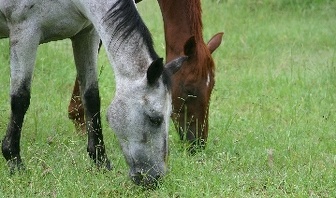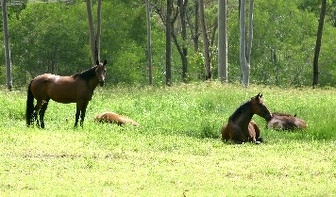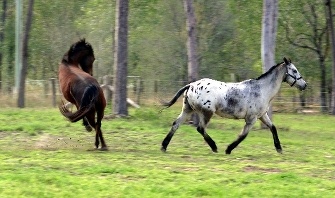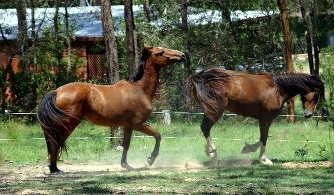How ESSENTIAL is companionship for a horse?
Feb 22, 2021
Horses naturally live in herds, and a normal horse is never alone by choice. Horses, if allowed, have a vibrant social life.
Companionship is one of the 3 F's - Forage, Friends, and Freedom, an essential framework for equine welfare.
The way that many horses are kept today was developed in a time when horses were simply a 'tool' for work. Therefore, traditional management practices do not usually consider important horse behaviour facts. It is time to re-examine horse management systems and see if we can do better.
Horses are herd animals not solitary animals
We all know that horses are herd animals, but many people do not understand or acknowledge this. A better understanding of herd behaviour means that horse management systems can incorporate rather than ignore basic but essential facts about horses.
As the equine community becomes more enlightened about the needs of horses, more and more people are willing to improve the 'lifestyle' of horses in their care, both for the welfare benefits and the improvement in performance that results from healthier, 'happier' horses.

In this age of enlightenment, more and more people are willing to improve the 'lifestyle' of horses in their care.
However, some horse owners become overwhelmed by having to make changes. There is so much conflicting information about how to keep horses it can be challenging to make the right decisions, especially as peer pressure can be a very powerful influencer.
How do natural or free-living horses live?
Wild and feral equines naturally live in small herds (family groups) that usually consist of a stallion, a few mares and their offspring. Horses have a powerful instinct to form attachments to other horses. These attachments are often for life.
Being part of a herd has many advantages for horses, such as 'safety in numbers'. A horse living alone in the wild would, sooner or later, be caught and killed by a predator; if predators are around, a wild horse will not survive very long at all. So horses feel safer when they have other horses around them. Domestic horses do not reason that they do not need to worry about predators. Their instincts tell them predators are lurking around every corner, so they do not feel safe if they live alone.
Also, horses that live alone do not get to benefit from the shared responsibilities of herd life and all the benefits of social behaviour.
So, domestic horses have the same instincts and behave in much the same way as their free-living cousins. If we ignore these facts about their natural behaviour, we can cause them to be stressed (more on this later).
These facts drive the behaviour of horses and cause them to do things that can seem irrational to us - such as panic if they get separated from other horses.
What are the daily behaviours of horses
Horses take turns watching over each other while they sleep. One horse usually stays standing when the others are asleep on the ground. This standing horse is more alert than the others (even if dozing) while the others sleep more deeply. This is an excellent example of how a herd operates.

Horses take turns watching over each other while they sleep.
When not eating or sleeping, horses carry out social behaviours termed 'loafing'. Loafing includes activities such as 'mutual grooming' and playing. Mutual grooming is where horses use their incisor teeth to groom each other, which is a critical behaviour for horses. The other horse can scratch areas that they cannot reach themselves. It is also a way of maintaining bonds among herd members.
Horses will stand together in the shade, nose to tail, during hot weather, using their tails to keep flies off each other. In cold, wet weather, horses will stand in a sheltered spot together because their large bodies help to keep each other warm.
Playing and running together is another essential behaviour for horses of all ages. In a group of horses, youngsters learn the group rules and socially acceptable behaviours from other herd members.

Playing and running together is another essential behaviour for horses of all ages.
What do horses do when they are stressed?
Due to a lack of companionship, a stressed horse may show behaviours that include running around (usually up and down the fence line that prevents the horse from reaching other horses) and whinnying. They may also lose weight. A horse that has been separated from other horses for a long time may show dull switched-off behaviour termed 'learned helplessness'. This learned helplessness is a behaviour that the horses develop to prevent them from being in a permanently stressed state. Learned helplessness can also occur in horses that live alone but appear stress-free.
Can other animal species be suitable enough company for a horse?
A horse will bond with another type of animal if that is all that is available. In a stabled situation, horses have even been known to bond with a chicken, goat or cat, but another horse is the best companion for a horse.
This is because different animal species behave in different ways that do not usually fulfil each animal’s needs. For example, goats, sheep and cows are ruminant animals which means that they typically eat more quickly than a horse and then spend more time lying down ruminating. In contrast, horses spend longer grazing and digest their food while grazing (and therefore lay down for less time).
There are other behavioural differences, such as a horse's need to spend time in mutual grooming, the need to watch over each other while they sleep, and the fact that horses play into old age.
Can a human be good enough company for a horse?
Horses need other horses. Humans do not make a good enough substitute for another horse. Apart from the fact that a human cannot be with their horse 24/7, they cannot perform the functions that another horse can, such as mutual grooming, standing over the horse while they sleep and playing any of the many (very boisterous) games that healthy horses play. It is not acceptable to deliberately keep your horse without the company of other horses so that they bond more strongly with you.
Is it OK to separate horses?
Ideally, a horse should always be able to see and touch another horse. Many horse owners separate horses in paddocks believing this to be the safest way to keep them; however, this often leads to fence injuries as horses walk the fence line or stand next to each other on either side of a fence or play over a fence because they have a strong need to be together. Some horses even charge straight through a fence to get to a mate. Keeping horses in 'herds' also allows you to manage your pasture better as this way, paddocks can be rested for periods between grazing periods, allowing the pasture to re-grow.
Look at this free mini-course, Horses, Pasture and Grazing, for more information about horse welfare and pasture management - www.equiculture.net/equiculture-free-mini-course
If building stables, aim to build horse-friendly stables (rather than fully partitioned cages). This way, the occupants can still touch and socialise when confined, maybe with just a small partition in the area where they feed.
What about aggression in horses kept together?
Aggression is only used when necessary because it is dangerous for the aggressor and the victim. Actual aggression is not common in free-living horses; horses often display body language that seeks to avoid aggression. Horses have many facial expressions and gestures that convey their intentions to other horses, so actual aggression is only used if necessary.
When domestic horses are fed concentrates, this tends to increase aggression. So separating horses for the short time it takes to eat concentrated feed is usually necessary. For example, horses can be separated into individual yards or stables for the short time it takes to eat any supplementary feed for their safety and the safety of handlers.

When domestic horses are fed concentrates, this tends to increase aggression.
So, the take-home message for this article is that when horses live in captivity, their strong herd instincts do not disappear and cannot be disregarded. When living in a herd situation, domesticated horses interact with each other in the same way that they would in a wild/feral situation. Domestic horses have retained all their herd instincts, which is one reason horses can and do survive successfully if they are released or escape into the wild.
If you enjoyed this article, check out the others on the blog. Also, make sure you sign up for the free mini-course called Horses, Pasture and Grazing and the free 23-page PDF called 10 common POSITION and BALANCE checks for riders

















